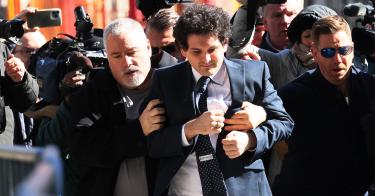Everyone deserves their day in court. Disgraced former crypto king and FTX founder Sam Bankman-Fried hasn’t yet had his, but he’s already looking to take advantage of someone else’s victory at the U.S. Supreme Court.
As a brief refresher, Sam Bankman-Fried (SBF as he’s known) is the son of two Stanford law professors. He founded FTX, a Bahamas-based cryptocurrency exchange that allowed users to trade digital currencies. FTX also created its own cryptocurrency and engaged in an unprecedented marketing blitz with SBF as the face of the company—and of crypto more broadly. After quickly amassing one of the top cryptocurrency exchanges in the world—with an estimated worth of $32 billion dollars by January 2022—SBF became an instant billionaire (on paper) and donated lavishly to left-leaning candidates and political causes that aligned with his effective altruism worldview (make a lot of money to do “good” with it).
But it was all a sham. And it quickly came crashing down.
It also became apparent in the fallout that SBF had acted foolishly and deceptively—and perhaps even criminally—so federal fraud charges quickly came.
>>> Is Crypto Insider Trading Really “Insider Trading”?: Prosecuting Fraud in the Crypto Space
The U.S. Attorney’s Office for the Southern District of New York initially filed an eight-count indictment against SBF alleging fraud, money laundering, and campaign finance offenses. It later filed a superseding thirteen-count indictment, adding allegations related to bank fraud, operating an unlicensed money transmitting business, and violating the anti-bribery provisions of the Foreign Corrupt Practices Act. Many of these allegations are framed as conspiracies to violate these laws.
The Securities and Exchange Commission and the Commodity Futures Trading Commission also filed civil suits against SBF, alleging that he committed securities and commodities fraud by lying about FTX’s financial stability. Since much of the same conduct is at issue, these civil cases have been put on hold pending the resolution of the criminal charges.
Par for the course in any criminal case, SBF’s lawyers filed pretrial motions, including several seeking additional discovery, a bill of particulars, and dismissal of certain charges, among other requests. But less than a week after filing these motions, SBF’s lawyers were back before the court seeking to supplement their submissions.
According to SBF’s lawyers, the Supreme Court’s new opinion in Ciminelli v. United States “has a direct bearing on the viability” of at least five counts filed against him. And they believe this new opinion could change the game in his favor on those counts.
At first blush, the facts of Ciminelli appear to be a world away from the facts in SBF’s case. Ciminelli owned a construction company and tried to obtain lucrative construction work from then-New York Governor Andrew Cuomo’s “Buffalo Billion” initiative in upstate New York. SBF, on the other hand, is charged with committing (supposedly) sophisticated financial fraud from his perch in the Bahamas.
But according to SBF’s lawyers, the government based certain fraud charges against both men on a “right-to-control” theory of fraud.
Ordinarily, fraud—including wire fraud—involves depriving someone of property. More than thirty years ago, though, the Second Circuit Court of Appeals expanded the meaning of property under the federal wire fraud statute to include certain intangible property rights, such as the “right to control” information about discretionary economic decisions regarding property. If someone schemed to deprive his victim of this information, the court asserted that it could be wire fraud (assuming the other elements of the crime are met).
But in reviewing Ciminelli’s case, a unanimous Supreme Court said not so fast. In an opinion written by Justice Clarence Thomas, the Court held that the “right-to-control” theory cannot form the basis for a conviction under the federal wire fraud statute because “the wire fraud statute reaches only traditional property interests,” and the “right to valuable economic information needed to make discretionary economic decisions is not a traditional property interest.”
>>> Biden’s Anti-Crypto Scaremongering Threatens to Impose Surveil-and-Control on All Americans
As a result, SBF’s lawyers argue that several of his fraud-related charges should be dismissed because the government grounded them on this “right-to-control” theory.
The government vehemently disagrees, stating:
Having no basis to challenge these counts as charged, the defendant instead conjures an imagined indictment premised on the “right-to-control” theory of wire fraud, and argues that such an indictment would not sufficiently allege a property interest under the Supreme Court’s recent decision in Ciminelli v. United States . . . In fact, as alleged in the Indictment, the defendant’s bank fraud scheme was designed to obtain billions of dollars of funds from the custody and control of Bank-1—an interest explicitly protected by Section 1344(2) [the federal bank fraud statute]. And as alleged in the Indictment, the defendant’s wire fraud schemes deprived FTX customers and Alameda lenders of dollars and cryptocurrency—interests explicitly protected by Section 1343 [the federal wire fraud statute]. Whatever arguments the defendant may make about an indictment alleging a scheme to defraud a victim of its right to control its assets have no relevance to the crimes actually charged in this case.
Interestingly, in a footnote, the government seeks to contain the Supreme Court’s decision in Ciminelli to wire fraud cases and keep its rationale from bleeding over into bank fraud cases too. It argued that the “wire fraud holding in [a prior Second Circuit crypto-related case, United States v. Lebedev] may have been abrogated by the Supreme Court in Ciminelli, but the Supreme Court did not address the Second Circuit’s bank fraud holding.”
Only time will tell how these arguments will play out in SBF’s case—and in others too. His criminal trial is currently set for October. And it will certainly be one to watch.
This piece originally appeared in The Federalist Society




